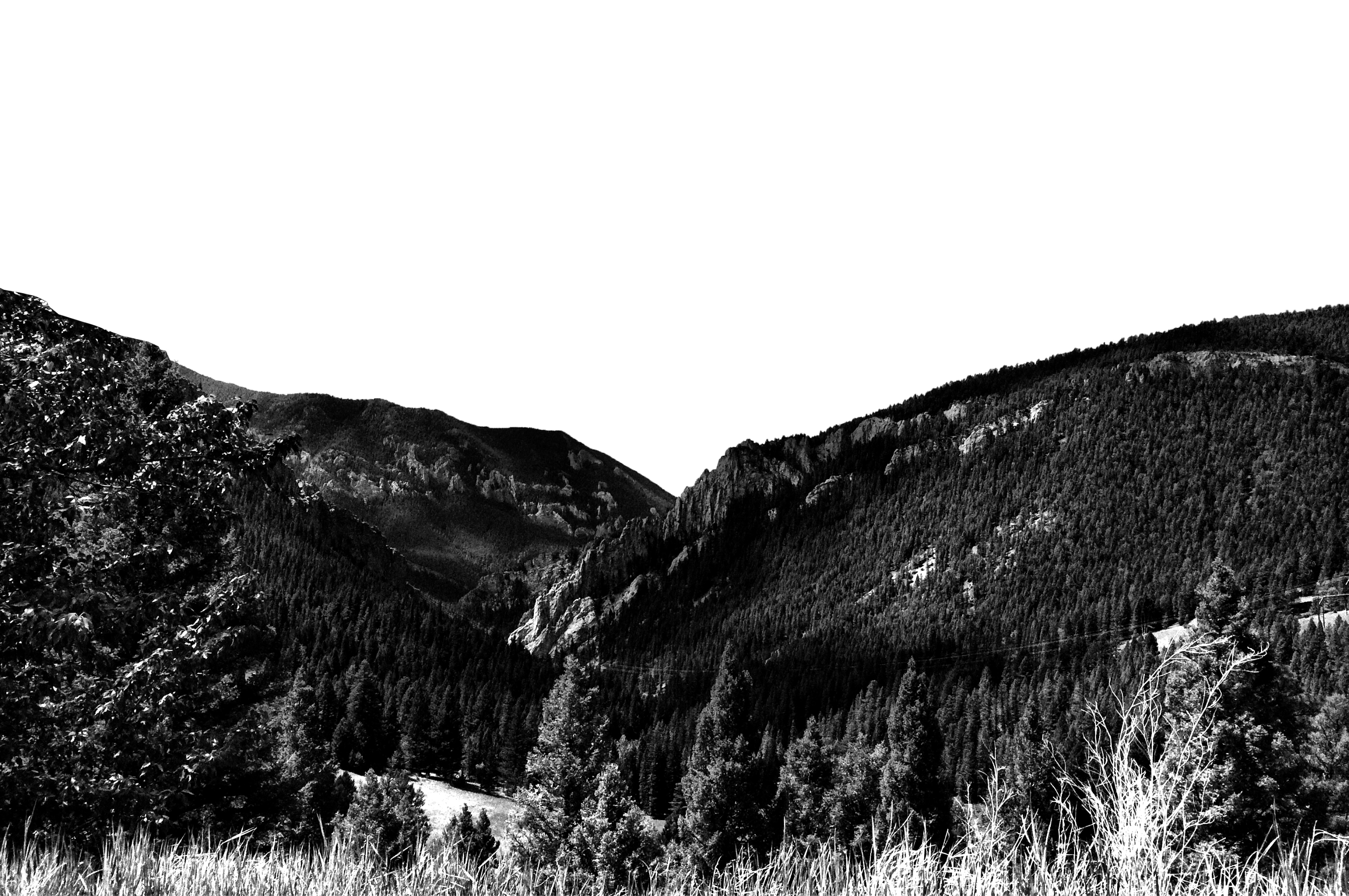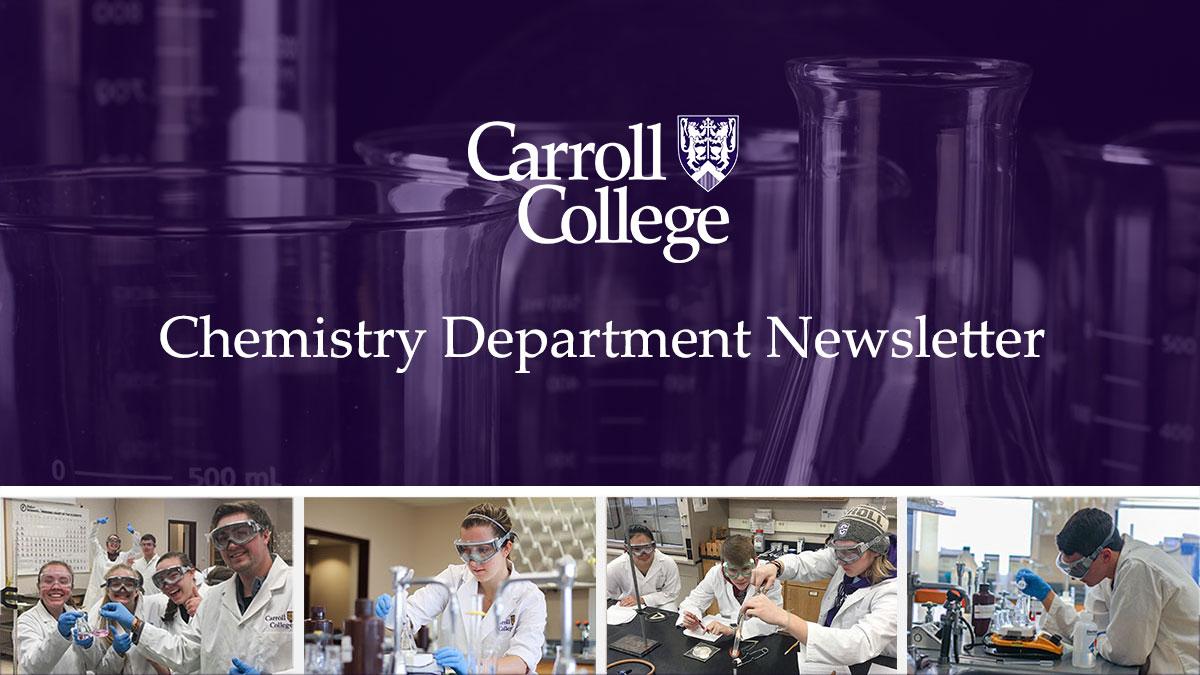Dear Carroll College Chemistry Alumni and Supporters:
It has been several years since we sent a newsletter to our alumni and supporters. We feel that it is a good time to reach out and update you on our department.
Our Students Continue to Achieve Inside and Outside the Classroom
NCUR and SURF
This year, all ten of our students who applied to the National Council of Undergraduate Research Conference (NCUR) were accepted to present their research. Our students also applied to present at Carroll’s annual Student Undergraduate Research Festival (SURF). Many of these presentations covered research conducted in our senior research-based capstone course called the Integrated Lab. The topics presented ranged from “Metalation of Pyrrole-Based NNN-Pincer Ligands with Heteroaromatic Donor Substituents” to “Electronic Effects of p-Phenyl Substituted Substituents on the Electrochemical Oxidative α-Thiophene Dimerization”.
Ultimately, the NCUR conference was canceled due to travel restrictions as a result of the COVID-19 pandemic. Carroll’s SURF, however, did occur as scheduled in an online format.
Our students shared their research with the campus community by creating online video presentations. All of the 2020 Digital SURF presentations are available on YouTube.

Real-World Research
In addition to juniors and seniors conducting research as a part of their regular coursework, the chemistry program provides multiple opportunities for freshmen and sophomores to make progress on answering real-world problems.
A recent example is the inaugural offering of CH103, Accelerated General Chemistry: a one-semester accelerated general chemistry course with active-learning practices in the lecture and open-ended research-like experiences in the lab. The development of this course was supported by an Educational Enhancement Grant from NASA’s Montana Space Grant Consortium (MSGC). To facilitate the condensed nature of the course, the chemistry faculty developed over 60 online tutorial videos and corresponding online comprehension quizzes. In addition to the accelerated pace of the course, we incorporated an open-ended research project in the laboratory section of the course. In collaboration with the Montana Department of Environmental Quality (MT DEQ), the chemistry students determined the concentration of nitrogen and phosphorus at which algal blooms occur in Canyon Ferry Lake. The results from the CH103 experiments will assist the MT DEQ in developing a water quality model to predict nutrient levels that result in algal blooms.
Figure 1. a) Photograph of CH 103 students and MT DEQ collaborators gathering lake water samples from Canyon Ferry Lake. b) Nitrogen and phosphorus spiked algae samples after incubation arranged in a matrix. c) Contour plot of chlorophyll concentrations from the nitrogen and phosphorus spiked algae samples analyzed via steady-state ultraviolet-visible (VU-Vis) spectroscopy.

Chemistry Faculty
The chemistry department has grown over the past few years and we wanted to update you on the faculty you know and the faculty you may not yet have met. There are currently six chemistry faculty.
 Professor Dan Gretch (dgretch@carroll.edu) joined the faculty at Carroll College in 2007. He teaches biochemistry courses. Dr. Gretch conducts research with our undergraduate students discovering new viruses (called phages) that infect bacteria. Dr. Gretch is the pre-medical advisor and directs the Biochemistry and Molecular Biology (BMB) program.
Professor Dan Gretch (dgretch@carroll.edu) joined the faculty at Carroll College in 2007. He teaches biochemistry courses. Dr. Gretch conducts research with our undergraduate students discovering new viruses (called phages) that infect bacteria. Dr. Gretch is the pre-medical advisor and directs the Biochemistry and Molecular Biology (BMB) program.
 Associate Professor David Hitt (dhitt@carroll.edu) joined the faculty at Carroll College in 2012. He teaches organic chemistry and the Integrated Lab. Dr. Hitt conducts research with our undergraduate students on designing metal-arene complexes for use in organic synthesis and in the synthesis of medicinally-relevant organic compounds. Dr. Hitt has implemented several course-based research experiences, including the restructuring of the second-semester organic chemistry lab to have students synthesize research-inspired compounds for use in his and other chemistry and biology research programs.
Associate Professor David Hitt (dhitt@carroll.edu) joined the faculty at Carroll College in 2012. He teaches organic chemistry and the Integrated Lab. Dr. Hitt conducts research with our undergraduate students on designing metal-arene complexes for use in organic synthesis and in the synthesis of medicinally-relevant organic compounds. Dr. Hitt has implemented several course-based research experiences, including the restructuring of the second-semester organic chemistry lab to have students synthesize research-inspired compounds for use in his and other chemistry and biology research programs.
Assistant Professor Julie Kessler (jkessler@carroll.edu) joined the faculty at Carroll College in 2017. She teaches inorganic  chemistry, organic chemistry, general chemistry, and the Integrated Lab. Dr. Kessler conducts research with our undergraduate students on transition metal coordination compounds with multi-dentate ligands that act as catalysts in organic transformations. Dr. Kessler has mentored several summer and semester undergraduate research students who have gone on to present their research at regional and national conferences.
chemistry, organic chemistry, general chemistry, and the Integrated Lab. Dr. Kessler conducts research with our undergraduate students on transition metal coordination compounds with multi-dentate ligands that act as catalysts in organic transformations. Dr. Kessler has mentored several summer and semester undergraduate research students who have gone on to present their research at regional and national conferences.
Associate Professor Caroline Pharr (cpharr@carroll.edu) joined the faculty at Carroll College in 2011. She teaches  organic chemistry and the Integrated Lab. Dr. Pharr conducts research with our undergraduate students on carbene intermediates, which are important reactive intermediates used in metal-catalyzed cross-coupling reactions in chemical laboratories to make carbon-carbon bonds and are commonly found as a material present in interstellar space. Dr. Pharr has mentored several undergraduate research students who have won external funding and presented their work at national conferences.
organic chemistry and the Integrated Lab. Dr. Pharr conducts research with our undergraduate students on carbene intermediates, which are important reactive intermediates used in metal-catalyzed cross-coupling reactions in chemical laboratories to make carbon-carbon bonds and are commonly found as a material present in interstellar space. Dr. Pharr has mentored several undergraduate research students who have won external funding and presented their work at national conferences.
 Associate Professor John Rowley (jrowley@carroll.edu) joined the faculty at Carroll College in 2013. He teaches physical chemistry, general chemistry courses, and the Integrated Lab. Dr. Rowley conducts research with our undergraduate students on solar fuel technologies by developing new mechanisms that use visible light to drive carbon-carbon bond-forming reactions. Dr. Rowley has received several external grants to develop new courses and to fund his research.
Associate Professor John Rowley (jrowley@carroll.edu) joined the faculty at Carroll College in 2013. He teaches physical chemistry, general chemistry courses, and the Integrated Lab. Dr. Rowley conducts research with our undergraduate students on solar fuel technologies by developing new mechanisms that use visible light to drive carbon-carbon bond-forming reactions. Dr. Rowley has received several external grants to develop new courses and to fund his research.
 Professor Kyle Strode (kstrode@carroll.edu) joined the faculty at Carroll College in 2000. He teaches analytical chemistry, instrumental methods, and general chemistry. Dr. Strode is the chemical safety and hygiene officer and assists students with analytical chemistry research projects associated with the Integrated Lab. Dr. Strode chaperones international service trips and has recently collaborated on the development of an international summer course, The Chemistry, and Culture of Cuisine in France.
Professor Kyle Strode (kstrode@carroll.edu) joined the faculty at Carroll College in 2000. He teaches analytical chemistry, instrumental methods, and general chemistry. Dr. Strode is the chemical safety and hygiene officer and assists students with analytical chemistry research projects associated with the Integrated Lab. Dr. Strode chaperones international service trips and has recently collaborated on the development of an international summer course, The Chemistry, and Culture of Cuisine in France.
Remote Learning
 On March 17, Carroll College transitioned to all remote learning instruction in response to COVID-19. In addition to using the existing on-campus distance learning facilities, the Chemistry faculty spent the weeks and weekends before March 17 preparing at-home spaces to deliver lecture content and provide office hours. Our top priorities are student safety and student learning; we were prepared to ensure both.
On March 17, Carroll College transitioned to all remote learning instruction in response to COVID-19. In addition to using the existing on-campus distance learning facilities, the Chemistry faculty spent the weeks and weekends before March 17 preparing at-home spaces to deliver lecture content and provide office hours. Our top priorities are student safety and student learning; we were prepared to ensure both.
 The transition to remote learning was relatively easy for the faculty due to our strong relationships with students, clear course expectations, and the use of online learning materials we created. Regularly scheduled lectures and office hour help sessions occurred using online conferencing programs. Often the live lectures were recorded and posted online to accommodate our students’ ever-changing schedules.
The transition to remote learning was relatively easy for the faculty due to our strong relationships with students, clear course expectations, and the use of online learning materials we created. Regularly scheduled lectures and office hour help sessions occurred using online conferencing programs. Often the live lectures were recorded and posted online to accommodate our students’ ever-changing schedules.
 Several students volunteered to make high-quality YouTube videos of the remaining general chemistry laboratory experiments for the semester. General chemistry laboratory students were able to watch the videos, gather the necessary experimental data and observations, and complete the lab analysis, all in a remote learning modality.
Several students volunteered to make high-quality YouTube videos of the remaining general chemistry laboratory experiments for the semester. General chemistry laboratory students were able to watch the videos, gather the necessary experimental data and observations, and complete the lab analysis, all in a remote learning modality.
We are extremely grateful for the outreach and engagement we have seen from our alumni and supporters. The transformative experiences we provide our students are made possible through your generosity. In addition to your financial support, we appreciate your feedback, insights, and ideas which are also important for the future success of our programs.
Please feel free to reach out to any of us via email and you can also follow us on Instagram @Carroll_College_Chemistry.
Sincerely,
The Carroll College Chemistry Faculty

